2021新高考八省(市)适应性测试卷(2021年八省联考英语卷)
八省联盟2021届上学期新高考适应性英语试题
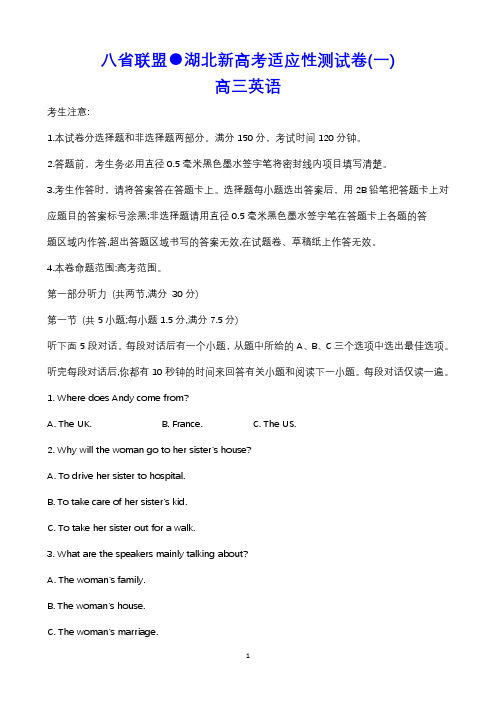
八省联盟●湖北新高考适应性测试卷(一)高三英语考生注意:1.本试卷分选择题和非选择题两部分。
满分150分,考试时间120分钟。
2.答题前,考生务必用直径0.5毫米黑色墨水签字笔将密封线内项目填写清楚。
3.考生作答时,请将答案答在答题卡上。
选择题每小题选出答案后,用2B铅笔把答题卡上对应题目的答案标号涂黑;非选择题请用直径0.5毫米黑色墨水签字笔在答题卡上各题的答题区域内作答,超出答题区域书写的答案无效,在试题卷、草稿纸上作答无效。
4.本卷命题范围:高考范围。
第一部分听力(共两节,满分30分)第一节(共5小题;每小题1.5分,满分7.5分)听下面5段对话。
每段对话后有一个小题,从题中所给的A、B、C三个选项中选出最佳选项。
听完每段对话后,你都有10秒钟的时间来回答有关小题和阅读下一小题。
每段对话仅读一遍。
1.Where does Andy come from?A.The UK.B.France.C.The US.2.Why will the woman go to her sister's house?A.To drive her sister to hospital.B.To take care of her sister's kid.C.To take her sister out for a walk.3.What are the speakers mainly talking about?A.The woman's family.B.The woman's house.C.The woman's marriage.4.When will the computer club end this afternoon?A.At3:45.B.At4:15.C.At4:30.5.How does Christine probably feel about her new haircut?A.Dissatisfied.B.Pleased.C.Unconcerned.第二节(共15小题;每小题1.5分,满分22.5分)听下面5段对话或独白。
2021年八省联考新高考英语模拟试题答案与完整解析

6. Where are the speakers? • A. In a restaurant. B. In a bookstore. 7. What does the man have to do now? • A. Sign his name. B. Wait his turn.
语法填空
56.including 57.valuable 58.satisfied 59.to let 60.during 61.that 62.an 63.specifically 64.as 65.student’s
•
听力部分
第一节
第二节
Text 1 Text 2 Text 3 Text 4 Text 5 Text 6 Text 7 Text 8 Text 9 Text 10
we need a cupboard in the kitchen much more. •
• 5. What does the man think of the movie? • A. Top quality. B. Above average. C. Surprisingly bad. • 原文 • W: Hey, Thomas. How was the movie last night? • M: It was OK, not exactly a top quality one but still a welcome
体育运动 饮食 饮食
购买东西 讨论电影 订餐 租房
参观公司 装潢房子
现场音 乐会
1. Why does the woman refuse to go to the gym?
八省联考英语参考答案
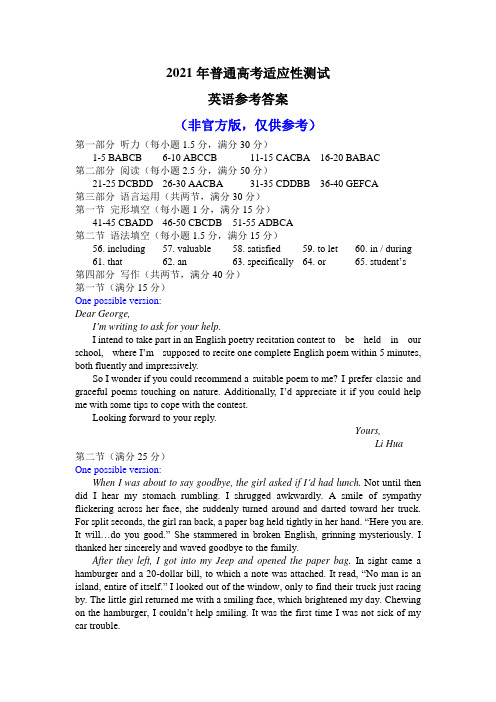
2021年普通高考适应性测试英语参考答案(非官方版,仅供参考)第一部分听力(每小题1.5分,满分30分)1-5 BABCB 6-10 ABCCB 11-15 CACBA 16-20 BABAC第二部分阅读(每小题2.5分,满分50分)21-25 DCBDD 26-30 AACBA 31-35 CDDBB 36-40 GEFCA第三部分语言运用(共两节,满分30分)第一节完形填空(每小题1分,满分15分)41-45 CBADD 46-50 CBCDB 51-55 ADBCA第二节语法填空(每小题1.5分,满分15分)56. including 57. valuable 58. satisfied 59. to let 60. in / during61. that 62. an 63. specifically 64. or 65. student’s第四部分写作(共两节,满分40分)第一节(满分15分)One possible version:Dear George,I’m writing to ask for your help.I intend to take part in an English poetry recitation contest to be held in our school, where I’m supposed to recite one complete English poem within 5 minutes, both fluently and impressively.So I wonder if you could recommend a suitable poem to me? I prefer classic and graceful poems touching on nature. Additionally, I’d appreciate it if you could help me with some tips to cope with the contest.Looking forward to your reply.Yours,Li Hua第二节(满分25分)One possible version:When I was about to say goodbye, the girl asked if I’d had lunch. Not until then did I hear my stomach rumbling. I shrugged awkwardly. A smile of sympathy flickering across her face, she suddenly turned around and darted toward her truck. For split seconds, the girl ran back, a paper bag held tightly in her hand. “Here you are. It will…do you good.” She stammered in broken English, grinning mysteriously.I thanked her sincerely and waved goodbye to the family.After they left, I got into my Jeep and opened the paper bag.In sight came a hamburger and a 20-dollar bill, to which a note was attached. It read, “No man is an island, entire of itself.” I looked out of the window, only to find their truck just racing by. The little girl returned me with a smiling face, which brightened my day. Chewing on the hamburger, I couldn’t help smiling. It was the first time I was not sick of my car trouble.。
精品解析:2021年1月普通高等学校招生全国统一考试适应性测试(八省联考)英语试题(解析版)
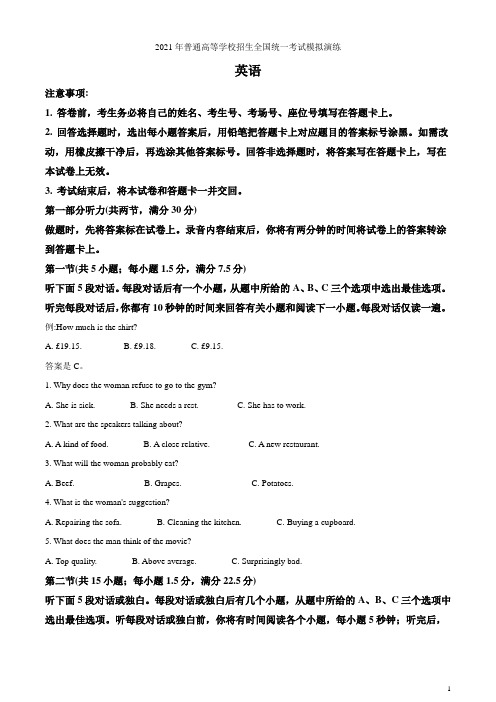
2021年普通高等学校招生全国统一考试模拟演练英语注意事项:1. 答卷前,考生务必将自己的姓名、考生号、考场号、座位号填写在答题卡上。
2. 回答选择题时,选出每小题答案后,用铅笔把答题卡上对应题目的答案标号涂黑。
如需改动,用橡皮擦干净后,再选涂其他答案标号。
回答非选择题时,将答案写在答题卡上,写在本试卷上无效。
3. 考试结束后,将本试卷和答题卡一并交回。
第一部分听力(共两节,满分30分)做题时,先将答案标在试卷上。
录音内容结束后,你将有两分钟的时间将试卷上的答案转涂到答题卡上。
第一节(共5小题;每小题1.5分,满分7.5分)听下面5段对话。
每段对话后有一个小题,从题中所给的A、B、C三个选项中选出最佳选项。
听完每段对话后,你都有10秒钟的时间来回答有关小题和阅读下一小题。
每段对话仅读一遍。
例:How much is the shirt?A. £19.15.B. £9.18.C. £9.15.答案是C。
1. Why does the woman refuse to go to the gym?A. She is sick.B. She needs a rest.C. She has to work.2. What are the speakers talking about?A. A kind of food.B. A close relative.C. A new restaurant.3. What will the woman probably eat?A. Beef.B. Grapes.C. Potatoes.4. What is the woman's suggestion?A. Repairing the sofa.B. Cleaning the kitchen.C. Buying a cupboard.5. What does the man think of the movie?A. Top quality.B. Above average.C. Surprisingly bad.第二节(共15小题;每小题1.5分,满分22.5分)听下面5段对话或独白。
2021年普通高等学校招生全国统一考试适应性测试(八省联考)英语试题(含答案)
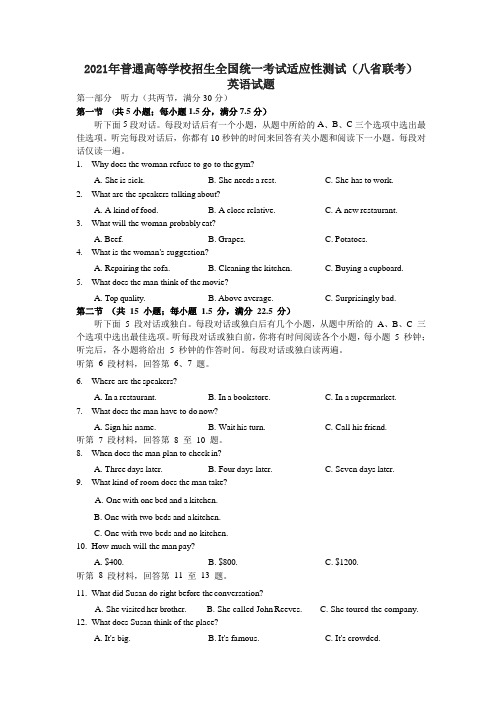
2021年普通高等学校招生全国统一考试适应性测试(八省联考)英语试题第一部分听力(共两节,满分30分)第一节(共5小题;每小题1.5分,满分7.5分)听下面5段对话。
每段对话后有一个小题,从题中所给的A、B、C三个选项中选出最佳选项。
听完每段对话后,你都有10秒钟的时间来回答有关小题和阅读下一小题。
每段对话仅读一遍。
1.Why does the woman refuse to go to the gym?A. She is sick.B. She needs a rest.C. She has to work.2.What are the speakers talking about?A. A kind of food.B. A close relative.C. A new restaurant.3.What will the woman probably eat?A. Beef.B. Grapes.C. Potatoes.4.What is the woman's suggestion?A. Repairing the sofa.B. Cleaning the kitchen.C. Buying a cupboard.5.What does the man think of the movie?A. Top quality.B. Above average.C. Surprisingly bad.第二节(共15 小题;每小题1.5 分,满分22.5 分)听下面5 段对话或独白。
每段对话或独白后有几个小题,从题中所给的A、B、C 三个选项中选出最佳选项。
听每段对话或独白前,你将有时间阅读各个小题,每小题5 秒钟;听完后,各小题将给出 5 秒钟的作答时间。
每段对话或独白读两遍。
听第6 段材料,回答第6、7 题。
6.Where are the speakers?A. In a restaurant.B. In a bookstore.C. In a supermarket.7.What does the man have to do now?A. Sign his name.B. Wait his turn.C. Call his friend.听第7 段材料,回答第8 至10 题。
2021年全国新高考“八省联考”高考英语适应性试卷(附详解)
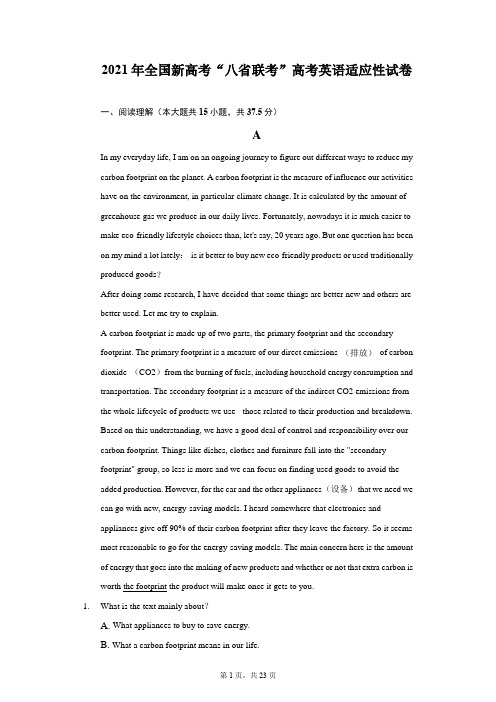
2021年全国新高考“八省联考”高考英语适应性试卷一、阅读理解(本大题共15小题,共37.5分)AIn my everyday life, I am on an ongoing journey to figure out different ways to reduce my carbon footprint on the planet. A carbon footprint is the measure of influence our activities have on the environment, in particular climate change. It is calculated by the amount of greenhouse gas we produce in our daily lives. Fortunately, nowadays it is much easier to make eco-friendly lifestyle choices than, let's say, 20 years ago. But one question has been on my mind a lot lately:is it better to buy new eco-friendly products or used traditionally produced goods?After doing some research, I have decided that some things are better new and others are better used. Let me try to explain.A carbon footprint is made up of two parts, the primary footprint and the secondaryfootprint. The primary footprint is a measure of our direct emissions (排放)of carbon dioxide (CO2)from the burning of fuels, including household energy consumption and transportation. The secondary footprint is a measure of the indirect CO2 emissions from the whole lifecycle of products we use - those related to their production and breakdown.Based on this understanding, we have a good deal of control and responsibility over our carbon footprint. Things like dishes, clothes and furniture fall into the "secondaryfootprint" group, so less is more and we can focus on finding used goods to avoid the added production. However, for the car and the other appliances (设备)that we need we can go with new, energy-saving models. I heard somewhere that electronics andappliances give off 90% of their carbon footprint after they leave the factory. So it seems most reasonable to go for the energy-saving models. The main concern here is the amount of energy that goes into the making of new products and whether or not that extra carbon is worth the footprint the product will make once it gets to you.1.What is the text mainly about?______A. What appliances to buy to save energy.B. What a carbon footprint means in our life.C. How to identify different carbon footprints.D. How to make eco-friendly lifestyle choices.2.What do we know about the secondary carbon footprint?______A. It is related to our consumption of fuels.B. It is made when we are buying the products.C. It is less harmful than the primary carbon footprint.D. It is counted as ours though not directly made by us.3.Which of the following helps reduce our carbon footprint according to the author?______A. Using second-hand textbooks.B. Using old and expensive cars.C. Buying new but cheap clothes.D. Buying new wooden furniture.4."The footprint" underlined in the last sentence refers to the CO2 produced in ______ .A. using the productB. recycling the productC. making the productD. transporting the productBMagic is a form of entertainment that is based on pretending to do things that areimpossible. The magician is a specially trained actor. He tries to make the audiencebelieve that he has the power to do things which are against the laws of nature.Magic shows are entertaining as long as the audience does not discover how the tricks are done. The magician usually depends on his skill with his hands, on his knowledge ofpsychology, and, sometimes, on mechanical devices (机械装置). Since magicperformance is meant to trick people, the use of psychology is important. The magician must keep people from noticing all the movements of his hands and from thinking about the secret parts of his equipment. He must also lead the audience to draw false conclusions.The magician's success depends on the fact that many things seen by the eye are not the things that matter.Two basic magic tricks are making objects seem to appear and making objects seem to disappear. A combination of these two tricks makes for some interesting effects. Forexample, the magician puts a small ball under one of several cups. The ball then seems to jump from one cup to another or to change colour. What actually happens is that themagician, employing quick hand movements or a mechanical device, hides one ball.While doing this he talks to the audience and waves a brightly coloured cloth with onehand. The audience is too busy watching the cloth and listening to the magician's words to notice that his other hand is hiding the ball.Another favourite trick is to cut or burn something,and then make it appear whole again.What actually happens is that the magician makes the cut or burned object disappear by quickly hiding it while the audience watches something else. Then he "magically" makes it appear whole again by displaying(展示)another object that has not been cut or burned.5.What is the author's main purpose in writing the text?______A. To promote a magic show.B. To teach people to be magicians.C. To explain the art of magic.D. To praise the talents of magicians.6.Which of the following is important for a successful magic trick?______A. Moving stage equipment.B. Directing the audience's attention.C. Applying high technology.D. Keeping the performance in secret.7.What does the author focus on in the last two paragraphs?______A. Providing examples.B. Making a summary.C. Drawing comparisons.D. Explaining a concept.8.What can we infer from the text?______A. Mechanical devices are expensive.B. Most magicians employ assistants.C. It takes practice to perform magic.D. Small objects are magicians' favourite.CThe average bear, it seems, is getting ever smarter. First, it turned out that at least one can use a comb. Now it appears that some can count, too.Jennifer Vonk, of Oakland University, in Michigan, and Michael Beran, from Georgia State University, set three American black bears the task of distinguishing betweennumerically larger and smaller groups of dots (点)on a computer screen. In return fora food reward one bear, Brutus, would touch the more heavily dotted pattern with his nose.The others, Bella and Dusty, would touch the screen with their claws (爪子).As the researchers report in Animal Behavior, the bears did best with patterns where the coloured dots did not move and where more of them also took up a larger coloured area.This could be explained by the bears' distinguishing the different areas of colour rather than truly counting the dots. However, the three bears managed to pick out the bigger number of dots even in pairs of patterns where fewer dots took up a larger area.Moving patterns, where each dot followed its own path around the screen, were more of a challenge. But Brutus, at least, was not defeated. He seemed to be counting mobile dots even when the scientists tried to mislead him by moving the total coloured area of the dots at the same time.It is not entirely surprising that bears should have a high degree of intelligence. They facea lot of challenges when trying to get food. They are, however, always alone, and so do nothave the complex social systems that contribute to animal smarts. Perhaps, then, their maths skill developed because they cannot count on their friends for help.9.What task did the scientists set for the three bears?______A. Distinguishing different dot patterns.B. Figuring out different colours of dots.C. Putting the dots into differently coloured groups.D. Picking out the group with a larger number of dots.10.For the bears, the task was easier when ______ .A. the coloured dots were moving slowlyB. the dot patterns were regular in shapeC. the dots followed a path on the screenD. more dots covered a larger coloured area11.What may explain the bears' high degree of intelligence?______A. They learn skills from other animals.B. They face life challenges on their own.C. They feed on a diverse range of food.D. They have complex social networks.12.What can be a suitable title for the text?______A. Bears Taught to Distinguish ColoursB. New Evidence of Bear Intelligence FoundC. Three Bears Learned How to CountD. The Smartest American Black Bear BrutusDNon-Credit Courses The Pre-College Program offers non-credit courses. Students will experience college-level courses given by some of our college's leading experts and will receive written feedback (反馈)on their work at the end of the course. Pre-College students will also receive a grade of Satisfactory/Unsatisfactory and a certificate of completion at the conclusion of the program.All non-credit courses meet from 9:00 a.m. - 11:30 a.m. daily and may have additional requirements in the afternoons or evenings.COURSE:Case Studies in Neuroscience●June 11 - July 2●Leah RoeschUsing student-centered, active-learning methods and real-world examples, this course is designed to provide a fuller understanding of how the human brain works. COURSE:Psychology of Creativity● June 15 - June 28● Marshall DukeWhy are certain people so creative?Is it genetic (遗传的),or a result of childhood experience?Are they different from everyone else?This popular psychology course highlights the different theories of creativity.COURSE:Creative Storytelling● June 21 - July 3● Edith FreniThis college-level course in creative storytelling functions as an introduction to a variety of storytelling techniques that appear in different forms of creative writing, such as short fiction and playwriting.COURSE:Sports Economics● July 19 - August 1● Christina DePasqualeIn this course we will analyze many interesting aspects of the sports industry:sportsleagues, ticket pricing, salary negotiations, discrimination, and NCAA policies to name a few.13.Who is the text intended for?______A. The general public.B. College freshmen.C. Educational experts.D. High school students.14.Which course can you take if you are free only in June?______A. Sports Economics.B. Creative Storytelling.C. Psychology of Creativity.D. Case Studies in Neuroscience.15.Whose course should you choose if you are interested in creative writing?______A. Leah Roesch's.B. Edith Freni's.C. Marshall Duke's.D. Christina DePasquale's.二、阅读七选五(本大题共5小题,共12.5分)Apps (short for applications)are becoming increasingly popular nowadays,and for good reason. They can help you out in just about every area of your life,whether it's keeping fit,communicating with friends,or even learning a language.(1)______ Here's what you should think about before downloading an app for language learning.• Learn from diverse sources (not just apps)Any seasoned language learner will tell you that the beauty of mastering a foreignlanguage is the world which it opens up to you. This is a world of diverse sources (来源)of information, from newspapers and books to TV,radio, music and even real people.Would you limit yourself to one medium in your native language?(2)______• Establish your purpose and plan your habitsDo you want to be fluent in weeks or are you in it for the brain training?The good apps are designed to help you fit your studies around your timetable.(3)______ These apps encourage habit building, because the successful formation of a habit ensures your safe and regular return.• Make it social(4)______ I mean social for real. I owe the speed of progress I made in Italian to the support from Jim,my partner in study time. Find a friend to accompany you. Take anevening class. Borrow a book. Buy a book. Book a week away and attend a languageschool. Just don't forget your phone!If I may speak sincerely, the combination of app, language school, Jim, evenings out, anda choice book or two proved extremely effective.(5)______A. I recommend it.B. Remember that an app is just a tool.C. No, I don't mean posting your progress online.D. I encourage you to use apps as often as you can.E. Probably not, so why do so in your new language?F. The best apps adapt themselves based upon your behavior.G. However, you need to know how to use them properly to really benefit.16. A. A B. B C. C D. D E.E F.F G. G17. A. A B. B C. C D. D E.E F.F G. G18. A. A B. B C. C D. D E.E F.F G. G19. A. A B. B C. C D. D E.E F.F G. G20. A. A B. B C. C D. D E.E F.F G. G三、完形填空(本大题共15小题,共15.0分)This happened when I was ten. On a normal Sunday,I went to the barber shop where I always went. That day, along with the barber there was an assistant, who had recently(1)______ the shop.So I sat for the haircut. The uncle asked me how(2)______ I wanted it. I answered,"Just do as my dad had(3)______ you the last time."He smiled. Before starting the(4)______ ,he added, "What if I keep it long?"I(5)______ he was joking. So I joked too. I said, "I can't(6)______ what would happen to your shop then!"The moment I said it, the assistant(7)______ from behind. "How dare do you say that!Who are you to take us down, eh?"I admit I was too(8)______ at that moment and the uncle standing beside me was givingme an(9)______ look.From that day on, I(10)______ stopped joking about anyone's profession and works. It is one of the most(11)______ incidents in my life, which taught me to(12)______ the profession and works of a person, no matter how(13)______ they are.I'm(14)______ that the assistant responded in a way that made me rethink the power of my words. Words do make a(15)______ .21. A. left B. opened C. joined D. visited22. A. much B. long C. often D. soon23. A. instructed B. invited C. promised D. convinced24. A. discussion B. journey C. training D. haircut25. A. agreed B. heard C. hoped D. knew26. A. forget B. tolerate C. guarantee D. understand27. A. urged B. shouted C. laughed D. helped28. A. angry B. proud C. scared D. curious29. A. anxious B. appealing C. encouraging D. awkward30. A. suddenly B. completely C. temporarily D. regularly31. A. important B. exciting C. strange D. interesting32. A. learn B. enter C. change D. respect33. A. hard B. small C. good D. complex34. A. sorry B. confident C. grateful D. embarrassed35. A. difference B. mistake C. choice D. joke四、语法填空(本大题共1小题,共15.0分)36. Like many other students, you may have various people, (1) (include) familymembers and friends, giving input on your college decision.While many of your trusted relatives and peers(同龄人) may have very (2) (value) advice that can help you to make the decision, finally the choice is yours and yours alone.Only you can fully realize which aspects of a college will make you truly happyand (3) (satisfy), so keep that at the front of your mind.Moreover, fully consider each option. It can be easy (4) (let) a particular schoolbecome a front-runner early on (5) your decision-making process, and it may evenbecome the winning choice—but be sure to carefully evaluate every school (6) has accepted you, since you had particular reasons for applying to each school.Do keep (7) open mind. Students can change majors, but remember that there's no re-living a certain semester(学期), and there's no making up for lost time. Don't go to a school (8) (specific) for a high school relationship (9) to make someone else happy.A (10) (student) college experience is his or her own, and the student must put his or hereducation first.(1)(2)(3)(4)(5)(6)(7)(8)(9)(10)五、书面表达(本大题共2小题,共40.0分)37.假定你是李华,准备参加学校组织的英文诗朗诵比赛。
2021年1月普通高等学校招生全国统一考试适应性测试(八省联考)英语试题(解析卷)
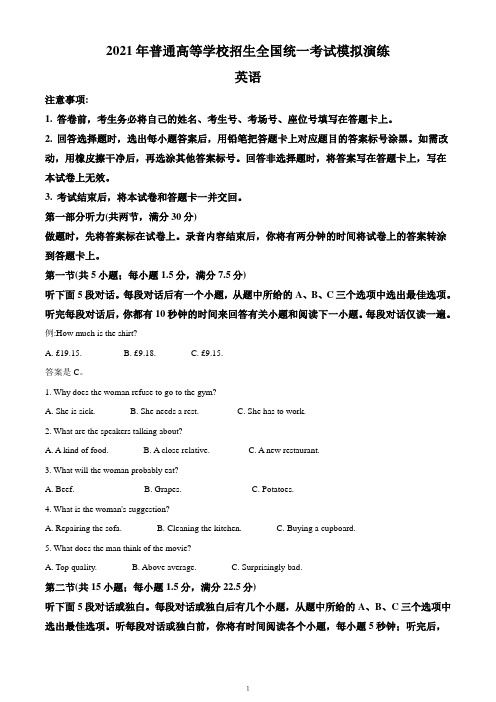
2021年普通高等学校招生全国统一考试模拟演练英语注意事项:1. 答卷前,考生务必将自己的姓名、考生号、考场号、座位号填写在答题卡上。
2. 回答选择题时,选出每小题答案后,用铅笔把答题卡上对应题目的答案标号涂黑。
如需改动,用橡皮擦干净后,再选涂其他答案标号。
回答非选择题时,将答案写在答题卡上,写在本试卷上无效。
3. 考试结束后,将本试卷和答题卡一并交回。
第一部分听力(共两节,满分30分)做题时,先将答案标在试卷上。
录音内容结束后,你将有两分钟的时间将试卷上的答案转涂到答题卡上。
第一节(共5小题;每小题1.5分,满分7.5分)听下面5段对话。
每段对话后有一个小题,从题中所给的A、B、C三个选项中选出最佳选项。
听完每段对话后,你都有10秒钟的时间来回答有关小题和阅读下一小题。
每段对话仅读一遍。
例:How much is the shirt?A. £19.15.B. £9.18.C. £9.15.答案是C。
1. Why does the woman refuse to go to the gym?A. She is sick.B. She needs a rest.C. She has to work.2. What are the speakers talking about?A. A kind of food.B. A close relative.C. A new restaurant.3. What will the woman probably eat?A. Beef.B. Grapes.C. Potatoes.4. What is the woman's suggestion?A. Repairing the sofa.B. Cleaning the kitchen.C. Buying a cupboard.5. What does the man think of the movie?A. Top quality.B. Above average.C. Surprisingly bad.第二节(共15小题;每小题1.5分,满分22.5分)听下面5段对话或独白。
